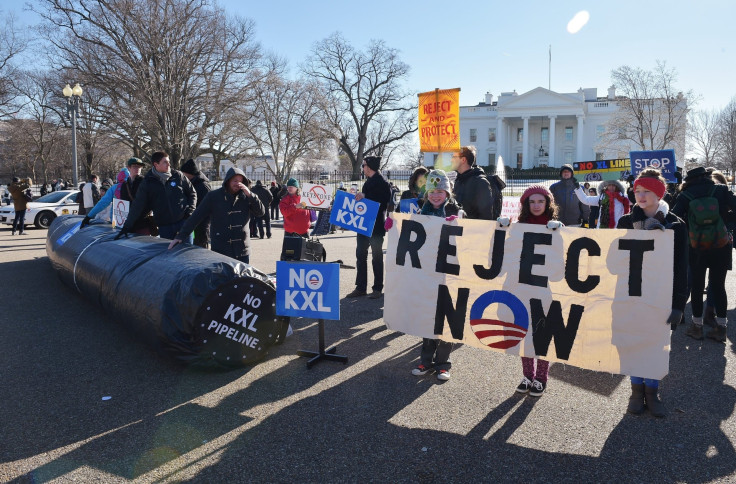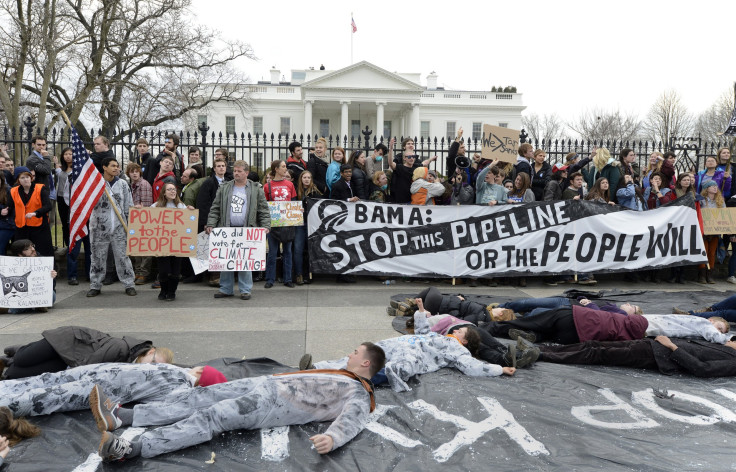Will Obama Reject TransCanada's Keystone XL Pipeline Request To Suspend Permit Application? Here's Why It Matters

Environmentalists likely rejoiced after the company behind the Keystone XL pipeline asked the U.S. government Monday to suspend its permit application for the ambitious, nearly 1,200 miles-long project that would transport crude oil from Canada down to the Gulf Coast. The move was widely seen as an attempt by TransCanada Corp. to avoid an official rejection of the pipeline by U.S. President Barack Obama. But with the White House maintaining that Obama will decide on the issue before he leaves office, activists said they may be close to a win in the environmental battle that has come to symbolize partisan fervor over fossil fuels.
The request came in a letter to the Department of State, in which TransCanada asked Secretary of State John Kerry to pause the department’s review of the proposed pipeline while the company undergoes a state assessment process in Nebraska that could take as long as a year. However, experts and activists said Obama has little reason to suspend the pipeline's review and that factors including political interests, the opportunity to leave an environmental legacy and dropping oil prices all contribute to their continued expectation he will nix the project.
“I think it’s clear that TransCanada expects Obama to reject its project,” Anthony Swift, the Canada Project director at the Natural Resources Defense Council, an environmental think tank based in New York City, said. “The president has committed to making a decision on Keystone before his term ends, and nothing in TransCanada’s letter should compel him to change his mind.”
The White House said Tuesday it seemed “unusual” there would be a pause in the government’s review of the pipeline, and the State Department said the review would continue while it is in the process of responding to TransCanada, according to Reuters.

TransCanada first proposed building the Keystone XL pipeline seven years ago. In the years since, the company has gone through many rounds of plans and various routes the pipeline could take were approved by both federal and state governments. After facing strong opposition from landowners in Nebraska where part of the pipeline is slated to sit, TransCanada decided last month to abandon its plan to use eminent domain to legally seize private property, instead opting for a regular permit approval process, which means it must get its plans approved by the Nebraska Public Service Commission. It is this process the company says necessitates a suspension of its federal review.
“Their rationale is that they want the State Department to wait to review all the routes in Nebraska,” Swift said. “But the State Department has already reviewed all the possible routes. All that’s left is for Nebraska to choose a route that the [federal] government has already approved.”
After so many years of debate around the issue of the Keystone XL pipeline, some environmental activists were surprised at TransCanada’s change in tune. But sustained activism against the pipeline has contributed to almost universal opposition to the project from Democrats, and dropping oil prices have arguably lowered the pipeline’s urgency.
“You can interpret that as them seeing as writing on the wall,” Stephen Kretzmann, executive director of environmental advocacy group Oil Change International, said about TransCanada’s request for a delay. “They’re hoping that this will be delayed to next president and that person will be favorable to XL, which cuts out all the Democrats.”
Despite this prevailing opinion about the company’s motives, TransCanada denied Tuesday that politics and next year's presidential election factored into its decision. CEO Russ Girling said the company has tried to steer clear of politics as the project has made its way through various regulatory processes since being proposed, according to the Canadian Press.
While TransCanada maintains its request is out of genuine need for a delay, environmental and political experts do not expect Obama to grant them one. The U.S. will meet with many other countries at the end of this month in Paris for the global climate summit, and many environmentalists have been hoping the president would reject the Keystone project ahead of that meeting.
Even if he does not reject the project now, Obama has another year before his term is up, and activists say his decision on Keystone could define his environmental legacy. If he allowed TransCanada to get its pause in the review, he would risk allowing a Republican president to approve the pipeline upon taking office.
“I don’t see any political upside for the Obama administration in accepting the request for delay, especially with all the Democratic candidates coming out against Keystone,” Matthew Hoffman, a political science professor who studies environmental governance at the University of Toronto, said.
While the timing of TransCanada's letter ahead of the Paris climate summit adds emphasis to the topics of energy and climate issues, experts did not seem to think the company's request ultimately adds much special pressure to the president's decision.
“There’s no question that this development highlights the deterioration in Keystone XL’s position,” Swift said. “But while they can withdraw their application, they have no authority to suspend the federal process. This really is in the State Department’s hands. It's the administration’s decision, and it is not up to TransCanada.”
© Copyright IBTimes 2025. All rights reserved.






















